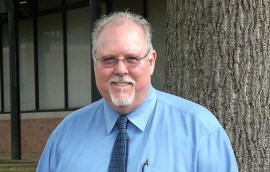|
 Political
correctness weakens resolve Political
correctness weakens resolve
By Jim Killebrew
 Send a link to a friend
Send a link to a friend
[October 04, 2014]
A
couple of days ago I posted a short piece on face book that explored
the implications of political correctness in our society. Perhaps
the most general definition of political correctness is "the
attitude or policy of being excessively careful not to offend or
upset any group of people in society who are believed to have a
disadvantage" (Wikipedia, Political Correctness). There are a couple
of interesting thoughts in that definition: First, the practice of
being "excessively careful" and second, the group in society that is
believed to have a "disadvantage." |
 Take the issue in sports today; the issue of the Washington Redskins. In
order to be offended by that name a person has to make an assumption that
Native Americans somehow become "disadvantaged" at the mere mention of that
name. Wrapped up in that assumption is an admission from the "offended"
person that they personally believe the individual who is Native American
actually is a "disadvantaged" person. That is especially true if the person
being offended is not a Native American. Then, the person has to search
around to find some euphemistic term to use in order to be "excessively
careful" not to mention the term that "offends" those not of the class
supposedly being offended. Simply by using the euphemism the person
highlights the actual term trying to be avoided. Since everyone within
hearing distance of the use of the euphemism automatically knows what the
real term is that is being masked. Take the issue in sports today; the issue of the Washington Redskins. In
order to be offended by that name a person has to make an assumption that
Native Americans somehow become "disadvantaged" at the mere mention of that
name. Wrapped up in that assumption is an admission from the "offended"
person that they personally believe the individual who is Native American
actually is a "disadvantaged" person. That is especially true if the person
being offended is not a Native American. Then, the person has to search
around to find some euphemistic term to use in order to be "excessively
careful" not to mention the term that "offends" those not of the class
supposedly being offended. Simply by using the euphemism the person
highlights the actual term trying to be avoided. Since everyone within
hearing distance of the use of the euphemism automatically knows what the
real term is that is being masked.

The problem with chasing after the political correctness is exacerbated when
we realize the very term itself is a misnomer. It supposes the action of
changing names or terms is based solely on the political implications rather
than the actual morality of the situation. Under the paradigm the action of
making a change is based on the ramifications it has on the political
structure rather than the actual structure. As the practice of "political
correctness" continues to grow, the politicians become more and more
derailed from their actual function and purpose. In America, a society of
multiculturalism, a foundation that has been a traditional strength, is
being turned on by the political structure to wage a war of sorts on the
very foundational traditions on which the country was founded. Last month 53
democrats voted to change the Constitution to abridge the First Amendment;
they wanted to ban all criticism coming their way. There is another effort
that cycles every few years from the PC crowd that wants to pass a "Freedom
of Information Act" to significantly squash any broadcast using public
airways from any conservative voice that disagrees with the progressivism of
the left-wing element. Fundamentally, as many people have come to recognize,
political correctness has begun to wage a war against Christian traditions
presumably to "separate church and state" in such a way as to identify
so-called phantom "disadvantaged" groups that might be offended if any
Christian practice or tradition is openly public. Politically correct action
tends to push any Christian activity to some church building to be hidden
behind closed doors. In this case, everyone who is not a Christian becomes
"disadvantaged" and is in danger of being offended"
[to top of second column] |
 Perhaps the most egregious political correction act beyond that
of squashing Christianity is the effect it is having on the economy
in America. From the time I was a little boy in Muskogee, Oklahoma I
have grown up believing it is okay to work for the American Dream of
working hard and getting ahead. My Dad always said, "When you work
for the other guy you do the job the best you can, do more than
asked of you and do it well." We have always worked hard, tried to
do better than expected and knew we would always come out ahead.
When a friend made good and received raises in pay and moved on to
make a lot of money in his job or business, we celebrated and
acknowledged his good fortune. We admired the wealthy because they
were giving jobs to people and making lives for countless families
much better in the long run.
Now, for some reason we are supposed to feel ashamed of trying to
reach the gold ring; ashamed to better ourselves by making it good.
We are supposed to despise the wealthy and blame them for our lives
not being on par with theirs. We are supposed to look down on the
American Dream and shun the hard-working guy who finally realizes
their dream and makes it big. Somehow it just doesn't seem right to
attack the "rich" for what they have. Who are we now anyway? Why
have we changed so much and become so set in our status quo and
become so lazy with our own personal motivation. We have become too
politically correct and lackadaisical in our motivation to give our
best.
Being "excessively careful" has a tendency to create indecisiveness.
Being thoughtful, reflective, rational, truthful using all evidence
and facts along with wise counsel tends to bring more decisiveness.
One need look only at the "hot" spots in the world of today and the
indecisiveness exhibited in responding to those issues presenting
danger to Americans to see that without the leadership needed we
become subject to the whims of others.

I think political correctness with its excessively careful
indecisive attempts to shield a "straw person or group" to be
labeled as disadvantaged has broken our spirit for things we used to
think were good things; things like honesty, integrity,
truthfulness, forthrightness, goodness and wholesomeness. I believe
if it is time to kick the political correctness out of our lives and
return to our roots to start doing our best again and quit trying to
place groups or people in the role of being disadvantaged.
[By JIM KILLEBREW]
Click here to respond to the editor about this
article.
|